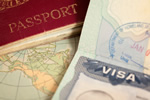Becoming a Swiss citizen just got harder

Becoming a Swiss citizen just got harder
Switzerland has been perennially popular as a home from home for millionaire UK financiers as well as Britons enjoying a generous pension and the lifestyle to match, but becoming a citizen of this pristine country is now more difficult than ever before. The previous requirements for those wishing to become Swiss citizens were anything but easy due to quirks and the high chance of denial, but the new rules now limit application to those already possessing C residence permits.
Most applicants go though the process of ‘regular naturalisation’, with the less complicated ‘facilitated naturalisation’ only possible for spouses and children of Swiss nationals and third-generation foreigners.The requirements of your commune, canton and the Swiss government must be met, starting with proof of residence for 10 years and continuing with proof of compliance with Swiss law and the posing of no threat to the state.
Being judged as ‘well integrated ‘ is essential, and involves the commune and canton’s opinions about how well you fit into Swiss social, linguistic and economic life as well as insisting you encourage your family to integrate as well. Another 2018 change forbids those who’ve been in receipt of benefits during the past three years from applying for citizenship unless the amount received is fully repaid.
The language test has become far more stringent and now includes a written test and demonstrative proof of A2 writing ability and B1 speaking skills. Getting on with the neighbours is essential as both cantons and communes interview applicants, quizzing them on everything from the area’s geography and public holidays to local festivals and traditions. After evaluating your response, a local committee votes on your application.
Applicants can expect several years or more of wondering whether they’ll ever become Swiss nationals, especially if they want or need to move to another area, meaning they’ll have to begin all over again. Worse still, the entire process can cost at least around 2,400 Swiss francs, with no refunds if you fail. Western Switzerland is he most generous as regards nationalisation, with Geneva also a reasonably good bet.
Related Stories:
- Expats and German citizens sticking to the rules and beating the virus - April 14, 2020
- British students and younger expats facing a Brexit-induced citizenship dilemma - January 31, 2020
- New Global Citizen study programme aims at expat students - November 15, 2019
- Navigating the expat minefield of compulsory Swiss healthcare insurance - October 3, 2019
- For expats, repatriation can be harder than relocation - September 27, 2019
- Expat Brits in Ireland happy to renounce UK citizenship - August 5, 2019
- In expat hell, the neighbours would be Swiss - July 19, 2019
- Are UK expats taking foreign citizenship to guard against Brexit effects? - June 12, 2019
- Gove promises free UK citizenship to EU expats should he become PM - May 28, 2019
- Applying for Medicare as an expat or new US citizen - May 2, 2019
Latest News:
- Tips on a trouble-free relocation as an expat overseas - July 20, 2020
- Expats find peace in the covid-19 refuge of Dahab town - July 20, 2020
- Is Kuwaitization the unintended result of the oil price crash? - July 20, 2020
- Expats unhappy abut changes to Korean points-based visa system - July 17, 2020
- Chiang Mai and Bangkok no longer bargain locations for expats - July 17, 2020
- Expats in Malaysia still banned from overseas travel - July 17, 2020
- Vietnam welcomes expats to its safe, affordable lifestyle - July 16, 2020
- Asian tiger economies reach out to expats in Hong Kong - July 16, 2020
- HSBC Asia to cut back on internal expat relocations - July 16, 2020
- Tips on integrating for newly-arrived expats - July 15, 2020


